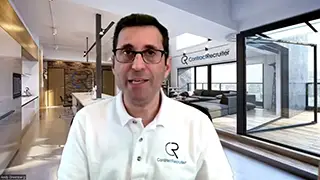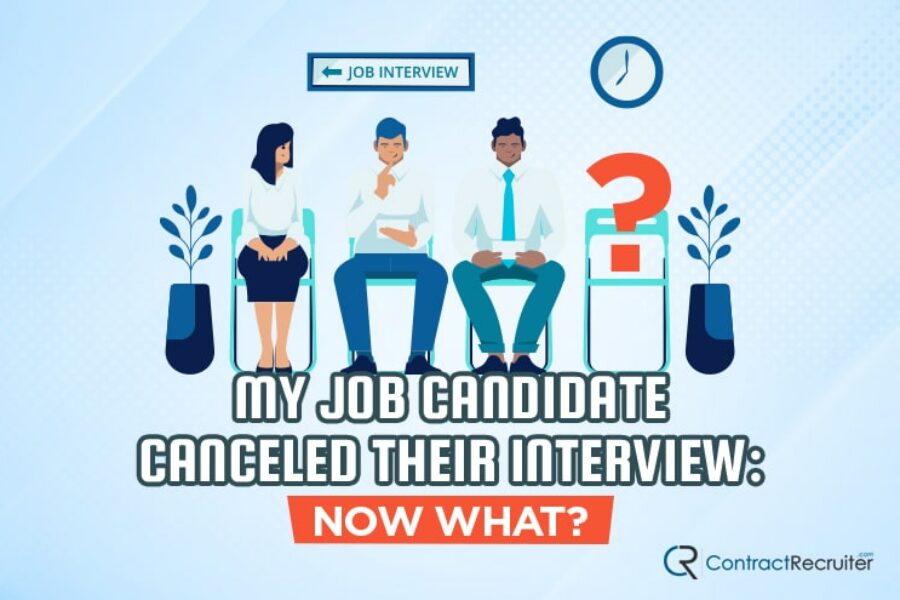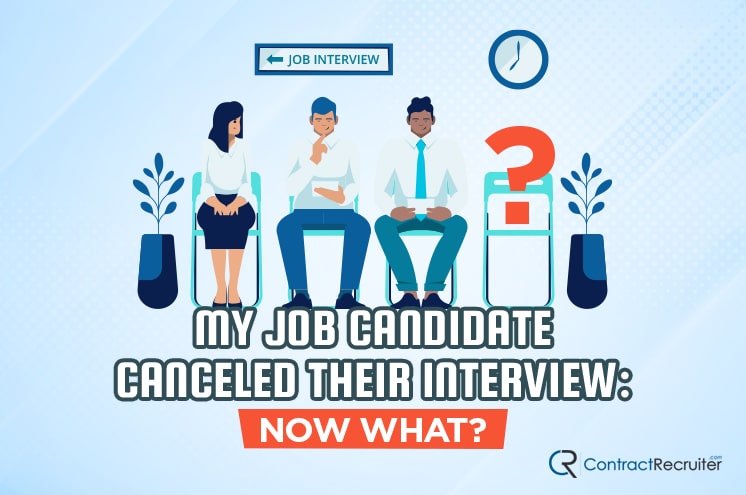

At first glance, it can seem offensive when a candidate cancels their interview with you. You’re giving them a fantastic opportunity, and all they need to do is attend the interview, yet they call the whole thing off.
It leaves you in a tricky position. You now have an open time slot, and the chances of getting someone else in to fill it are pretty slim, especially if it was a day-of cancelation. If you traveled to conduct the interview, it becomes a lot of wasted time and expense.
Before you get mad, remove them from your candidate pool, or take any actions, step back and take a deep breath. Chances are, it’s nothing personal. There are many reasons why a candidate may cancel an interview, and the steps you take following such a cancelation say a lot about you and your company.
Reasons Why a Candidate Cancels an Interview
A candidate will either tell you why they’re canceling the interview or won’t. If they do, you may have an opportunity to bring them back at another time. If they don’t, you may be able to reach out and ask what happened and take it from there.
There are many different reasons why a candidate might cancel an interview, or even no-call, no-show the interview. Some are bad, of course, but others are understandable and can be worked around. Knowing the reason why, to the best of your ability, is your first step.
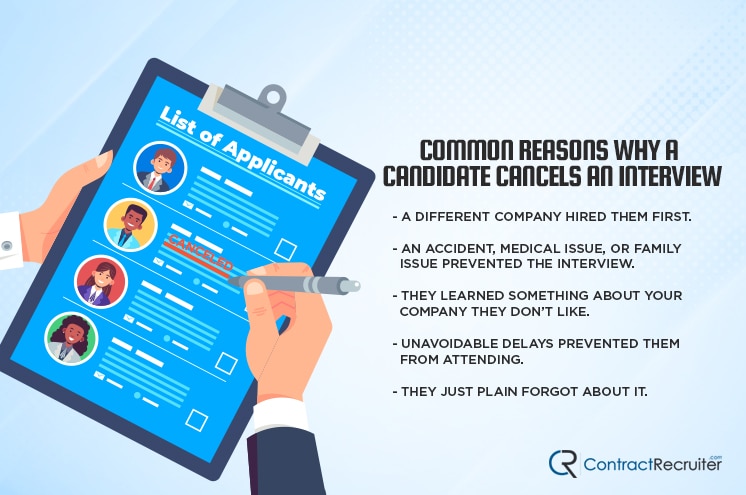

Some of the more common reasons why candidates cancel interviews include:
- A different company hired them first. The best candidates are in high demand, especially in the current candidate-focused job market. If your hiring process is slower than the competition’s, they will be able to get to a candidate first.
- An accident, medical issue, or family issue prevented the interview. Maybe your candidate was involved in a car crash on the way to the interview, their ailing mother tripped and had to be taken to the emergency room, or a child broke an arm. There are a million different reasons a candidate might have an emergency.
- They learned something about your company they don’t like. Sometimes, in researching your company, your candidate comes across something they don’t like. Maybe it’s some statement by your CEO. Maybe it’s malpractice on the part of service reps. Maybe it’s an overall reputation thing or a tip from an insider. It may even be a revelation about the salary range you offer. Whatever the case, they changed their mind about working with you.
- Unavoidable delays prevented them from attending. Maybe your candidate is flying in from out of state, and the airline delays the flight, so they can’t make it in time. Sure, you can say they should have flown out earlier, but that may not be possible, depending on their schedule.
- They just plain forgot about it. No one is perfect, and we all let things slip our minds. Something as high-priority as a job interview should usually be unforgettable, but sometimes, life is just so stressful things slip through the cracks.
Every reason a candidate cancels an interview has a different set of possible responses. The one central tenet is this: don’t get angry. Your response to a canceled interview will reflect on your company. An angry response will likely be circulated on social media and job search portals, earning your company a poor reputation.
Gather Information
The first thing you want to do is learn why the candidate skipped the interview. Generally, there will be a few kinds of responses.
The first, and the worst, is pure ghosting. Sometimes, a candidate has some reason why they’re no longer interested in working for you. Maybe they took another offer, or something happened, and they’re no longer in the market. Whatever the case, they no longer call you, they don’t answer their phone when you call, and they don’t respond to emails. They’ve entirely ghosted you.
This is terrible practice on the part of the candidate, but let’s be honest here: how many candidates have you dropped contact with in the course of hiring? For decades, companies have gotten away with simply ignoring anyone who doesn’t make it through the hiring process. Even a courtesy “we’ve selected someone else” email was too much for some businesses. Maybe not yours – perhaps you were good about it! – but many candidates have had bad experiences and don’t feel bad about turning the tables when the power is in their favor.
Sometimes, the candidate doesn’t care about burning a bridge. Sometimes, something comes up that gets in the way of contacting you. If your candidate was involved in a car accident and ended up in the hospital for a week before they could speak, well, there’s a justified reason for not contacting you.
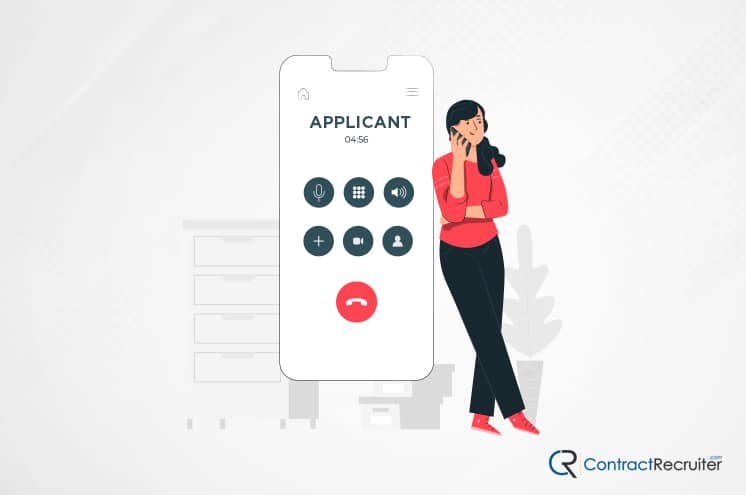

The important part is, if they reach back out to you, ask them why they weren’t able to let you know at the time. The way they answer will determine what kind of second chance you can give them.
The second possibility is that the candidate took another offer and is no longer interested in working for you. This is relatively common in the candidate-focused market right now, and it means you may need to make some changes to your hiring process to capture your candidates better.
Sometimes, the candidate will be responsive to communications but doesn’t think to reach out proactively. This can be a strike against them, but it may not mean they’re a terrible candidate. It’s up to you whether or not you keep them in your long-term candidate pool.
And, of course, sometimes something comes up, and the candidate will need to reschedule. If they proactively contact you and ask about rescheduling, you can work with them to pick a new time for their interview. Sometimes it hurts, especially if the lost time from the interview is expensive, but if the candidate is good enough, it’s worth it.
Take Steps to Reduce Interview Cancelations
A single interview cancelation is likely the candidate’s fault and may not be something you can solve. A series of them may indicate a trend in your hiring process that you need to solve.
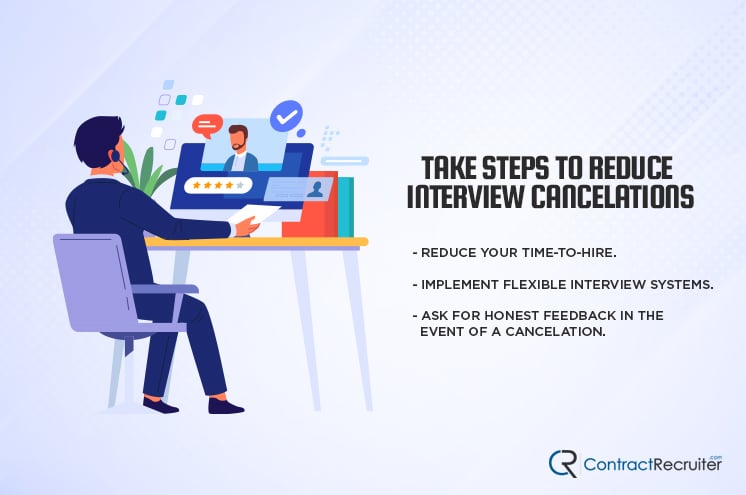

Here are some things you can look into:
1. Reduce your time-to-hire.
You may feel helpless if a candidate cancels their interview with you because they accepted another offer. The truth is, this isn’t entirely outside of your control. There are two things you can do.
The first is to ask the candidate what offer they received and see if you can beat it. You may not be prepared to offer them a job on the spot, but you may be able to convince them to still interview for it (perhaps under the guise of interview practice or a low-stakes interview) and offer them a better offer when they come in. Not everyone will bite, but some will, and you may be able to poach the candidate from your competition.
The second is to examine your hiring process. If competitors are hiring people out from under you when you haven’t even interviewed them yet, it means they started the hiring process earlier than you did (such as if the candidate has been putting out weekly applications for months), or their hiring process is faster than yours.
If you can find ways to reduce downtime and increase your hiring speed, you should be able to undercut the competition and reduce canceled interviews.
2. Implement flexible interview systems.
Interviewing doesn’t have to be rigid and inflexible. If you set a time and firmly stick to it, your candidate may not feel valued as a candidate. If they need to cancel, they may feel like it’s better to ghost you than try to work with you, especially if you come across as dismissive or put-upon for being asked to reschedule.
Sure, it can be a hassle to reschedule interviews multiple times with the same candidate. If your goodwill is being abused, it’s more than reason enough to cut off the candidate. However, you want to be flexible and open to alternatives for good candidates. If nothing else, it shows that your company has a culture of respect for your employees.
You may also consider shifting to a more flexible form of interview. Video interviews over Zoom or Skype, asynchronous interviews, phone interviews, and even interviews outside of typical business hours can all be good options for hooking candidates who have scheduling issues otherwise.
3. Ask for honest feedback in the event of a cancelation.
When an interview is missed or canceled, it can be worthwhile to send the candidate an email asking them for feedback. Ask honestly, and be prepared for brutally honest feedback.
For example, maybe your hiring representative was terse or rude – or just came across as such – which turned off the candidate. You may need to offer that employee more training to avoid such an issue.
Another possibility is that your salary range, benefits, or culture don’t work for the candidate, and they only found out after scheduling an interview. It can help if you’re more up-front with that information.
A common possibility is that you’re working with a shoddy third-party recruiting agency. That agency may be more interested in earning commissions based on lining up interviews, and less on providing relevant candidates, so the misalignment between candidate expectations and your open role gets in the way.
Proceed With Other Interviews
Sometimes, a candidate may have a valid reason for needing to cancel or reschedule an interview. Maybe they thought they had another offer on lock, only to lose it at the last minute, or they had a family emergency, and your job offer took second stage.
You should remain open to the possibility of still interviewing and potentially hiring the candidate. While some reasons for rescheduling (I forgot!) may be a strike against them, they had enough going for them to make it to the interviews in the first place, after all. And, of course, some things like family emergencies aren’t going to be regular occurrences.
At the same time, the world won’t wait for them, and neither should you. The chances are you have more than just one candidate lined up for interviews, and one candidate canceling an interview is not grounds for halting the entire process unless some regulation or law is saying otherwise.


You should be open to rescheduling the interview, but if too much time has passed and you’re hiring someone else, the opportunity is gone. The ball is in the candidate’s court for how proactively they reschedule and stay involved in the hiring process.
While some reasons a candidate bails on the interview are reasonable and worth overlooking, others are not. A candidate who forgets their interview date, schedules their transportation poorly, or otherwise doesn’t manage their time appropriately may be revealing something about their time management skills that would make them a worse employee than you expected.
Always Maintain Respect and Rapport
The hiring process is not an impartial, by-the-numbers, algorithmic process, as much as we like to use software and impartial scoring systems to run it. Today, a vital part of the hiring process is building rapport with your candidates.
When you have a more casual, closer relationship with your candidates, they will be more communicative and respectful of your time. It will reduce the rate of ghosting and no-call cancelations, and you’ll be more likely to get valuable feedback from them when you ask.


The worst thing you can do as an employer looking to hire is reacting strongly and negatively to a cancelation. If a single cancelation puts an employee on a denylist for the future, or if your hiring manager responds angrily to a cancelation, word will get around, and your candidate pool will worsen. Respect is essential, and it goes both ways.
Do you have any questions or concerns about how to handle an interview cancelation? If so, please feel free to leave a comment down below, and we’ll get a conversation started! Reacting appropriately to a situation such as this is critical, so if you would like a little more clarification on the topic, we would be more than happy to assist you however we can!
